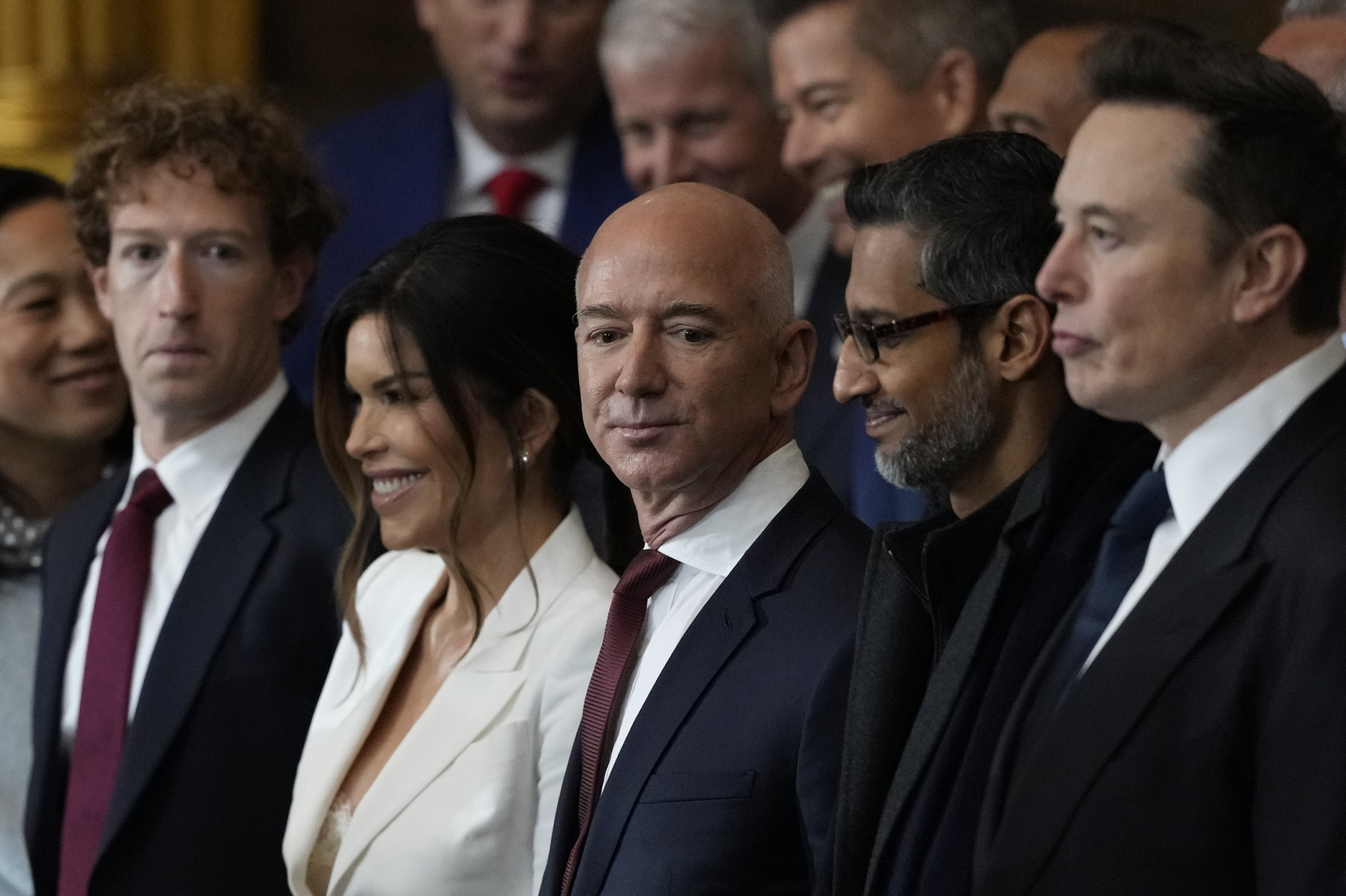Zuckerberg And Trump: A New Era For Tech And Politics

Table of Contents
The Rise of Social Media in Political Campaigns
Trump's 2016 Campaign and Facebook
Donald Trump's 2016 presidential campaign masterfully leveraged Facebook, setting a new precedent for social media's role in politics. His strategy relied heavily on targeted advertising, bypassing traditional media gatekeepers to directly reach potential voters. This allowed for highly personalized messaging, tailoring appeals to specific demographics and interests. The campaign's success, however, was also fueled by the spread of misinformation and "fake news," which proliferated unchecked on the platform. Facebook's then-lacking fact-checking mechanisms allowed false narratives to gain traction, potentially influencing the election's outcome.
- Successful Strategies: Highly targeted Facebook ads, direct engagement with supporters via posts and live streams, bypassing traditional media scrutiny.
- Unsuccessful Strategies: Overreliance on emotional appeals, leading to accusations of spreading divisive rhetoric; lack of responsiveness to criticism regarding misinformation.
- Reach and Impact: Trump's Facebook posts reached millions, shaping public opinion and driving engagement with unprecedented scale. The impact on voter behavior remains a subject of ongoing research and debate.
Zuckerberg's Response to Criticism
Zuckerberg's initial response to concerns regarding misinformation and foreign interference on Facebook during the 2016 election was met with significant criticism. His reluctance to acknowledge the platform's role in spreading false narratives and its vulnerability to manipulation drew intense scrutiny. However, the ensuing fallout led to substantial changes within Facebook (now Meta). The company invested heavily in fact-checking initiatives, improved its content moderation policies, and enhanced transparency measures.
- Key Policy Changes: Increased investment in fact-checking partnerships, improved algorithms to detect and flag misinformation, introduction of stricter advertising policies.
- Efforts to Increase Transparency: Public reporting on foreign interference attempts, greater transparency on ad spending, enhanced tools for users to report misinformation.
- Effectiveness Evaluation: The effectiveness of these changes remains debated. While some progress has been made, concerns about misinformation and manipulation persist, highlighting the ongoing challenges of regulating online content.
The Impact on Political Discourse
Polarization and Echo Chambers
Social media algorithms, designed to maximize user engagement, often contribute to political polarization and the creation of echo chambers. Targeted advertising further exacerbates this, reinforcing pre-existing beliefs and limiting exposure to diverse viewpoints. The Zuckerberg-Trump dynamic exemplifies this phenomenon; Trump's use of Facebook fostered a highly polarized online environment, amplifying existing divisions within society.
- Examples of Divisive Online Discussions: The spread of conspiracy theories, inflammatory rhetoric surrounding political opponents, and the creation of online communities dedicated to extremist ideologies.
- Statistical Data on Misinformation: Studies show a correlation between exposure to misinformation on social media and increased political polarization.
- Expert Opinions on Echo Chambers: Experts warn that the reinforcing nature of echo chambers can lead to political extremism and hinder constructive dialogue.
The Spread of Misinformation and Fake News
Social media platforms, including Facebook, played a significant role in disseminating false information during the 2016 election and subsequent political events. The ease with which misinformation can be created and shared, coupled with the challenges of effective fact-checking, presents a major threat to democratic processes. This highlights the ethical responsibilities of tech companies in combating the spread of fake news.
- Specific Examples of Fake News: The spread of false narratives about voter fraud, fabricated stories about political candidates, and the amplification of conspiracy theories.
- Regulatory Efforts to Combat Misinformation: Governments worldwide are exploring various regulatory approaches to address the spread of misinformation online, balancing free speech concerns with the need for accountability.
- Effectiveness of Fact-Checking Initiatives: While fact-checking organizations play a crucial role, their impact is limited by the sheer volume of misinformation and the speed at which it spreads online.
The Future of Tech and Politics in the Zuckerberg-Trump Era
Regulatory Challenges and Debates
The relationship between Zuckerberg and Trump has fueled intense debate surrounding the regulation of social media companies. The challenges are immense, requiring a careful balancing act between protecting free speech and addressing the harms caused by misinformation and manipulation. This necessitates a global conversation involving policymakers, tech companies, and civil society.
- Arguments for Stronger Regulation: Calls for increased transparency, stricter content moderation policies, and greater accountability for social media platforms.
- Arguments Against Stronger Regulation: Concerns that stronger regulation could stifle free speech and innovation.
- Legislative Proposals: Various legislative proposals have been introduced worldwide aiming to address misinformation, data privacy, and algorithmic transparency.
The Long-Term Implications for Democracy
The long-term implications of the Zuckerberg-Trump relationship for democracy are profound and multifaceted. The use of social media in political campaigns is likely to continue evolving, requiring ongoing adaptation from both political actors and technology companies. The ongoing challenges of combating misinformation and protecting democratic institutions necessitate a continuous dialogue and commitment to fostering responsible digital citizenship.
- Potential Scenarios for Future Elections: Increased reliance on social media for political communication, ongoing debates about campaign finance regulations, and the evolving role of artificial intelligence in political messaging.
- Evolving Relationship Between Technology and Politics: This relationship will remain complex and dynamic, demanding continuous evaluation and adaptation.
- Potential Solutions and Best Practices: Promoting media literacy, improving fact-checking mechanisms, and developing robust regulatory frameworks that balance free speech and accountability are essential.
Conclusion
The intertwined relationship between Zuckerberg and Trump has irrevocably altered the landscape of tech and politics. Their actions highlighted the profound impact of social media on political campaigns, the spread of misinformation, and the polarization of public discourse. The ongoing regulatory challenges and the long-term implications for democracy demand careful consideration and proactive solutions. Understanding the evolving relationship between figures like Zuckerberg and Trump is crucial to navigating the complexities of this new era in tech and politics. Continue your research and engage in thoughtful conversations to shape a better future where technology serves to strengthen, not undermine, democratic values. The future of how Zuckerberg and Trump, and their successors, interact will continue to define the relationship between technology and political power.

Featured Posts
-
 The Unexpected Business Strategy How One Airline Leverages Deportation Flights
Apr 24, 2025
The Unexpected Business Strategy How One Airline Leverages Deportation Flights
Apr 24, 2025 -
 60 Minutes Producers Resignation Independence Concerns Following Trump Legal Action
Apr 24, 2025
60 Minutes Producers Resignation Independence Concerns Following Trump Legal Action
Apr 24, 2025 -
 Sk Hynixs Dram Market Leadership Fueled By Ai Demand
Apr 24, 2025
Sk Hynixs Dram Market Leadership Fueled By Ai Demand
Apr 24, 2025 -
 Canadian Dollar Weakness A Deeper Dive Into Recent Currency Trends
Apr 24, 2025
Canadian Dollar Weakness A Deeper Dive Into Recent Currency Trends
Apr 24, 2025 -
 Deciphering The Liberal Platform A Critical Analysis By William Watson
Apr 24, 2025
Deciphering The Liberal Platform A Critical Analysis By William Watson
Apr 24, 2025
